Welcome to the February 2020 edition of the Curious Tea subscription! Here’s a closer look at the four exciting new teas that we are sharing with our subscribers this month.
The first light tea this month is a particularly floral high mountain oolong from the famous Alishan tea growing area of Taiwan.
The second light tea is an unusual green tea made from large leaf assamica plants grown on Pu Muen Mountain in northern Thailand.
For the dark side of the selection we have a classic ripe pu-erh tea from Haiwan Tea Factory in Yunnan that comes pressed into little bricks.
Finally, the last tea we are featuring this month is a complex Tie Guan Yin Oolong from Alishan in Taiwan that is expertly roasted to create a very traditional style of tea.
- Light: Alishan Green Heart Oolong and Pu Muen Assamica Green;
- Dark: Haiwan Mini Brick Ripe Pu-erh and Alishan Tie Guan Yin Oolong;
- Mixed: Alishan Green Heart Oolong and Haiwan Mini Brick Ripe Pu-erh.
Our Discovery subscription boxes contain 10g taster pouches of all of the above mentioned teas. If you are a subscriber you will benefit from a 10% discount on all teas from our tea shop!
Let’s get into further detail on the products featured in our February tea subscription boxes.
Alishan Green Heart Oolong
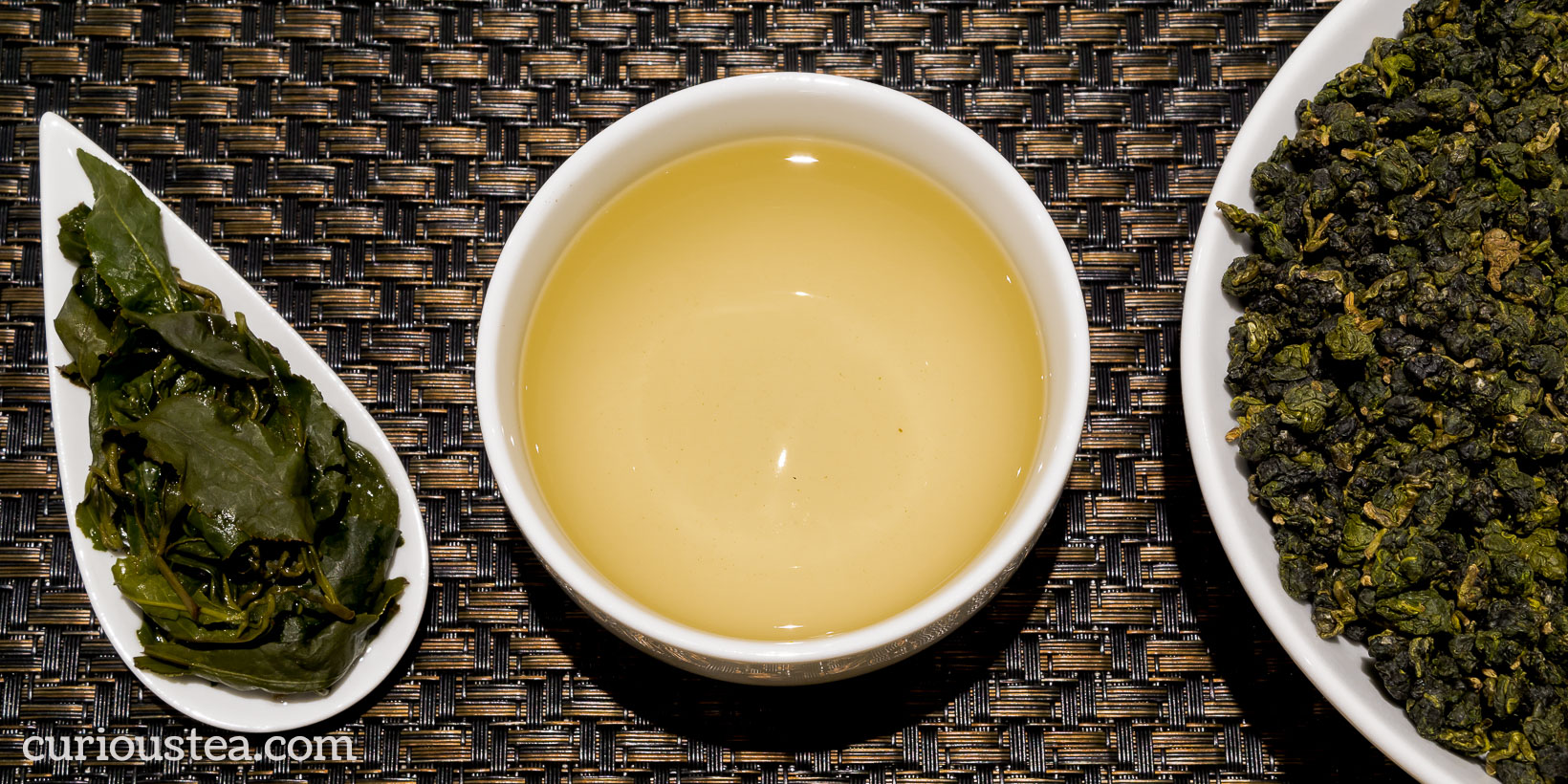
Alishan Green Heart Oolong (阿里山青心烏龍) is a lovely floral oolong from the famous Alishan tea growing area of Taiwan. Made from the Qing Xin (青心), or Green Heart cultivar, it has a bright character that is both floral and creamy. This particular batch is from April 2019 crop.
Green Heart or Qing Xin (青心) refers to the cultivar used for this Alishan Green Heart Oolong. Some consider it to be most likely the same as Ruan Zhi (軟枝 ‘Soft Stem’) plant that was brought from Fujian to Taiwan by the Japanese. Over time this cultivar has developed into what is now recognised as Qing Xin. Typically it has green, floral notes with subtle hints of mountain flowers, sometimes described as orchid. There is also a characterful sweetness and creaminess, reminiscent of buttered green beans.
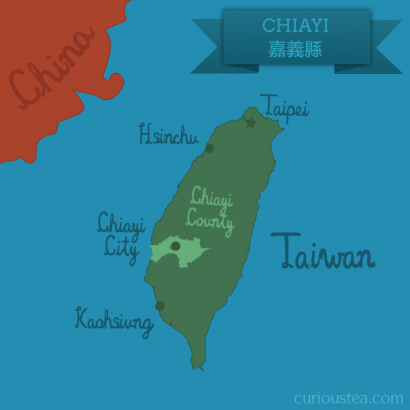
This high mountain Alishan Green Heart Oolong is grown at an altitude of 1,000-1,100 metres close to the famous Alishan National Scenic Area. It consists of rather large leaves and is approximately 15-20% oxidised. Unlike our Alishan Competition Qing Xin Oolong, it has not been baked. This results in a flavour that has more prominent floral notes while sacrificing a little of the complexity of baked teas.
This Alishan Green Heart Oolong has tightly rolled leaves that produce a very bright, light golden liquor with great clarity and a floral, creamy aroma. The fresh taste is predominantly floral, with clean and bright flavours that are buttery and verdant. The aftertaste is smooth, long-lasting, with a buttery edge and a touch of tanginess. Even though this tea has not undergone any baking, there are some very subtle baked notes present on the aftertaste. The taste further develops with subsequent infusions. Overall this is a delightfully floral and verdant tea that makes us think of a fresh summer’s breeze over alpine meadows.
It is best brewed at 90°C for 3 minutes according to your taste and should be brewed multiple times, increasing steeping time with each brew if desired.
You can also buy Alishan Green Heart Oolong tea in our online shop.
Pu Muen Assamica Green
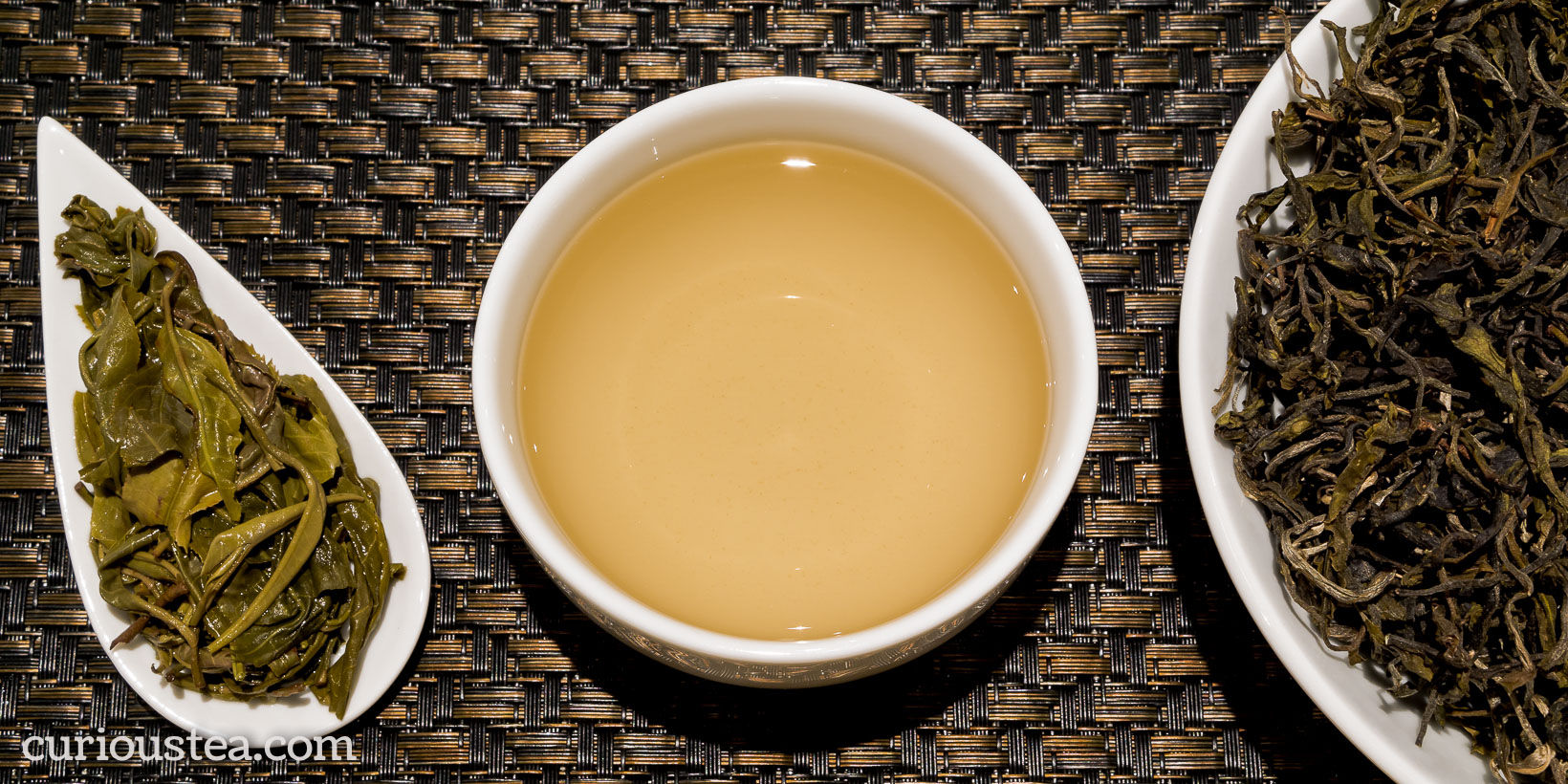
Pu Muen Assamica Green is a fully organic green tea from Pu Muen Mountain in northern Thailand. It is made from plantation-grown endemic assamica tea plants. This yields a complex tea that is most unusual in flavour and is slightly more akin to a white tea. We also refer to this tea as Cha Doi Kio, which means mountain green tea. This current batch is from April 2019 harvest.
This Pu Muen Assamica Green tea is grown at an altitude of approximately 1,100 metres at Doi Pu Muen, near Fang in Chiang Mai Province. The tea plantation is close to the border with Myanmar and is surrounded by Doi Pha Hom Pok National Park. It was planted by King Bhumibol Adulyadej in the 1970’s in order to better the lives of hill tribes by providing and supporting sustainable agriculture. The plantation was created to replace poppy fields that previously sustained many hill tribes in northern Thailand.
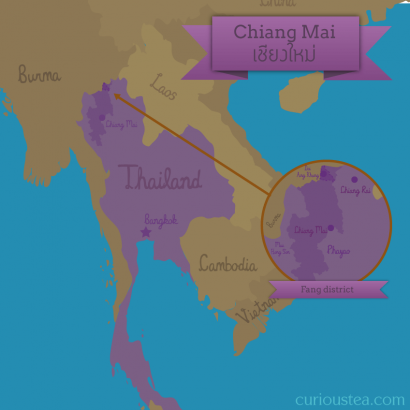
Many tea growers in Thailand tend to favour imported Taiwanese cultivars. So it is a little more unusual to see a plantation that instead opted to grow endemic assamica tea plants. This choice results in a tea that is quite a bit different to other plantation-grown Thai teas. The noticeably larger assamica leaves produce a character that is closer to teas from Yunnan Province in China or Assam in India. The tea plants are left to grow semi-wild on this plantation, allowing to grow into larger trees. The plantation also employs organic methods and has full organic certification.
This Pu Muen Assamica Green tea comes in rather large leaves that are wiry and dark in colour. The liquor produced has a clean golden colour and a light creamy aroma. The taste is particularly smooth, with a profile that is predominantly fruity with highlights of wood and hay. The liquor is very drinkable and has an overall delicate flavour. The flavour starts on fruity notes, becoming more woody and dry grassy. The clean aftertaste has a pleasant dry florality. This tea is quite unique for a green tea, largely due to utilising assamica plants. It is reminiscent of some white teas or even a light sheng pu-erh.
We suggest brewing at 80°C for 2-3 minutes according to your taste. It can be brewed around 2+ times depending on your taste preferences.
You can also buy Pu Muen Assamica Green tea in our online shop.
Haiwan Mini Brick Ripe Pu-erh
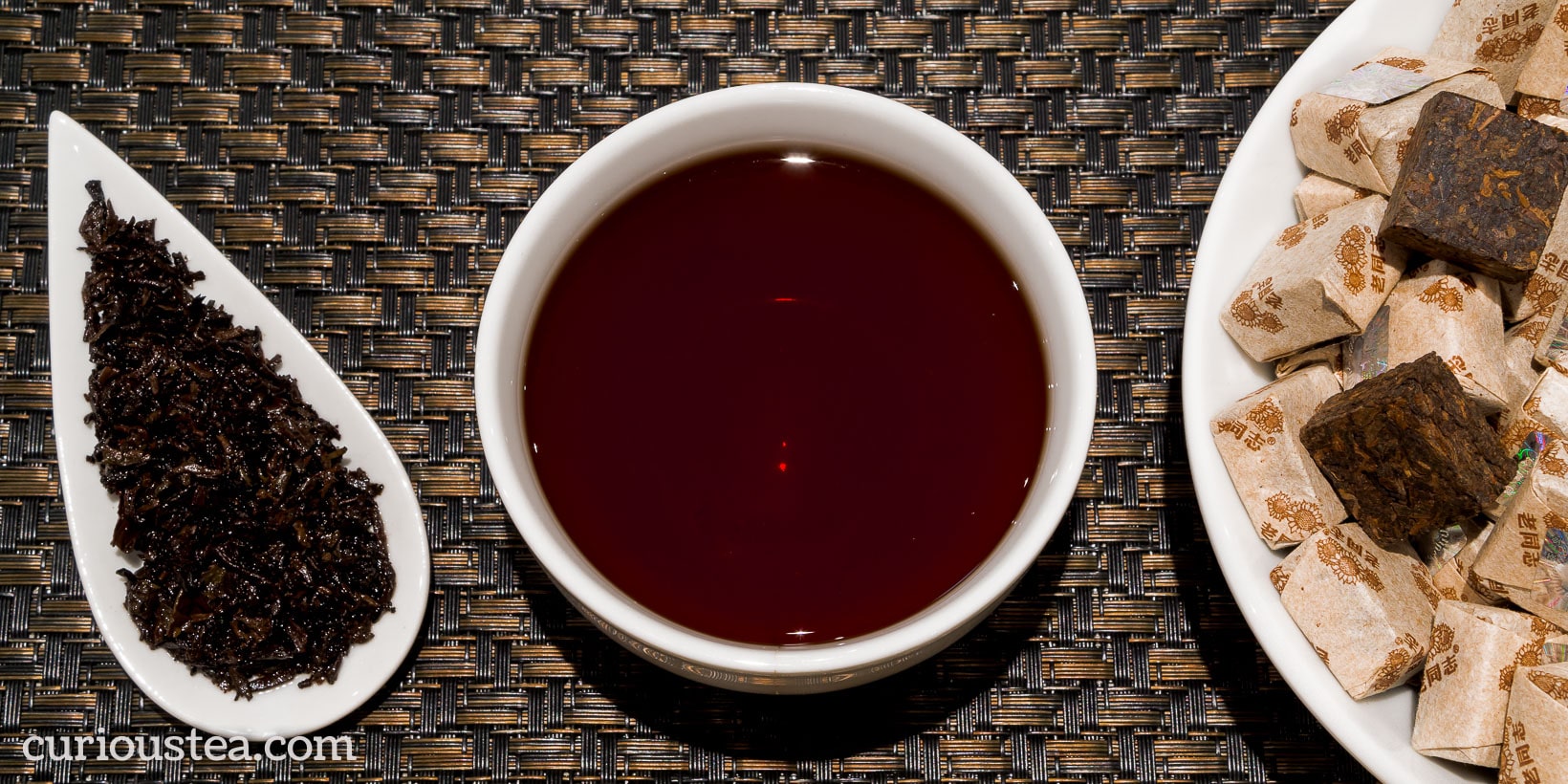
Haiwan Mini Brick Ripe Pu-erh (海湾小砖熟茶) is a ripe (shu) pu-erh from Menghai County, Xishuangbanna Dai Autonomous Prefecture, Yunnan Province. Made from leaves that are loosely pressed into small bricks, this ripe pu-erh has a classic woody profile with a rich flavour that is earthy and nutty. The current batch is from 2012 harvest so it is a little aged. Each mini brick weights around 4.5-5 grams, making it very convenient for brewing. Our 10g packs have 2 bricks, while 50g packs have on average 11 bricks.
These mini ripe pu-erh bricks make a nice difference to the usual mini tuo cha shape. They are produced by Haiwan Tea Factory (海湾茶厂), which is a reasonably new company. The founder of Haiwan Tea Factory, Mr Zou Bing Liang has worked in (since 1957), and managed the famous Menghai Tea Factory since 1984. In 1999 he decided to start his own factory with a focus on high grade tea and the high end market. Haiwan Tea Factory has grown in popularity and the products from here are highly sought after.
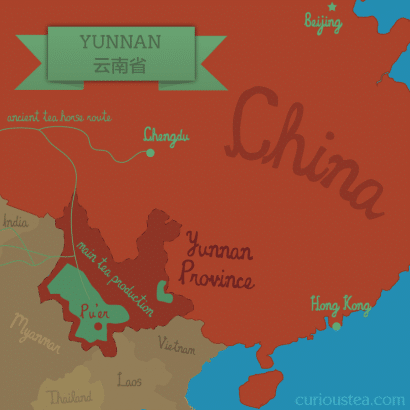
This Haiwan Mini Brick Ripe Pu-erh is a great introduction to shu pu-erh. It comes in individually wrapped mini bricks that are around 5 grams in weight. This makes them ideal for both western style brewing (1 tuo per 500ml pot) or gong fu brewing (1 tuo per gaiwan or yixing pot). As the leaves are loosely pressed together, the flavours are quickly released so it is suitable for quicker brewing if you prefer a lighter cup.
This tea comes pressed into small bricks, known as Zhuan Cha (砖茶). It is the traditional shape that was used to facilitate more efficient transport of tea along the ancient Tea Horse Road. Of course traditionally the bricks were much larger in size!
This ‘ripe pu-erh’ or ‘Shu Cha’ (熟茶) has undergone accelerated fermentation in order to speed up the ageing process and improve flavour. This technique is known as Wo Dui (渥堆), and is known as ‘wet piling’ in English. It was first developed in 1973 in Menghai Tea Factory and Mr Zou Bing Liang played a significant role in developing the technical aspects of this process. During the Wo Dui process the tea leaves are carefully processed under controlled conditions in a warm, humid environment. This process is somewhat similar to composting and is designed to simulate prolonged ageing that raw ‘sheng’ pu-erh would undergo under natural conditions over the course of many years. This speeded up fermentation normally takes 40-60 days and the tea is generally ready to drink straight after. However many prefer to leave it for a few extra years in order to even out the flavours post Wo Dui processing.
Haiwan Mini Brick Ripe Pu-erh tea bricks are formed of loosely pressed black leaves with some golden tips. The tea brews very quickly so it is easy to achieve a rich and deep, flavoursome liquor. The colour of the liquor is very dark, with a pronounced woody aroma. The taste is clean with dominant woody and earthy notes. The rich flavour has savoury notes of walnuts, red fruits and vine leaf. The aftertaste is superbly smooth, with a nice mineral edge. This is a very approachable tea that is great for everyday drinking or as an introduction to the world of ripe pu-erh.
We suggest brewing at 90°C for 3-4 minutes according to your taste. It should be brewed multiple times depending on your taste preferences.
You can also buy Haiwan Mini Brick Ripe Pu-erh tea in our online shop.
Alishan Tie Guan Yin Oolong
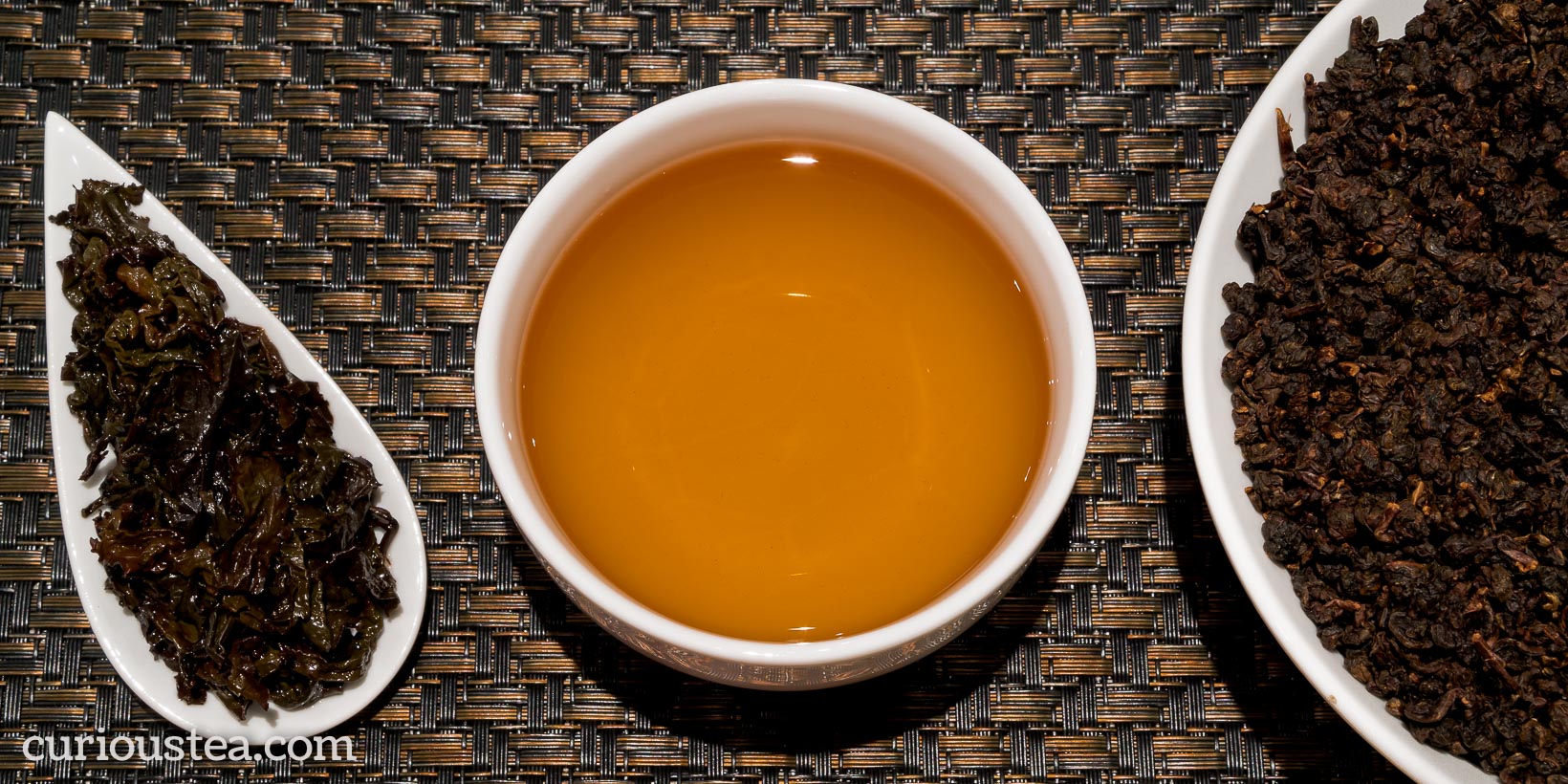
Alishan Tie Guan Yin Oolong (阿里山鐵觀音烏龍) is a complex high mountain oolong from the famous Alishan tea growing area of Taiwan. This is a traditional Muzha-style tea that has been expertly roasted to produce a wonderfully bold, classic roasted profile. Grown at an altitude of 1,000 metres, this particular batch was handpicked and baked in May 2019.
Tie Guan Yin Oolong is a particularly famous Chinese tea that originates from Anxi County of Fujian Province. Traditionally this kind of oolong tea should be roasted. The roasting process is also known as baking and such teas sometimes have the word charcoal in their name. However recent fashion in China means that most Tie Guan Yin oolongs produced there are very minimally oxidised. This style of ‘green oolong’ is increasingly popular due to bright floral flavours and there is much demand for these lighter style of teas. Hence it is often difficult to find a good traditionally roasted Tie Guan Yin Oolong from China. The roasting process requires great skill on part of the tea master and is time consuming. Many prefer to offer less time-intensive lightly oxidised teas instead. Our minimally oxidised Tie Guan Yin Oolong from Anxi is a prime example of this new modern style.

This Alishan Tie Guan Yin Oolong by comparison is a great insight into the more traditional and classic way of producing this oolong. The heritage processing methods have been kept alive and well in Taiwan ever since the original Tie Guan Yin plants and processing techniques were brought from Fujian over 100 years ago. The most famous Tie Guan Yin from Taiwan is undoubtably that from Muzha in northern Taiwan, just outside of Taipei. Here the heritage processing methods are still used to produce teas that are famous for their complexity. This particular Tie Guan Yin is from a different terroir; it is made from Tie Guan Yin bushes that were planted at a small family garden in Alishan. The tea is slowly fired by the tea master over a period of several weeks using the same heritage processing methods employed in northern Taiwan. She is highly skilled and is in fact responsible for the vast majority of our Taiwanese teas that have undergone any sort of finishing by roasting.
The leaves of this Alishan Tie Guan Yin Oolong are tightly rolled, oxidised to about 20-25% and are medium to highly baked. The liquor produced is bright and very clear with a comforting roasted aroma. The roasted profile exhibits complex multi-layered flavours that are clean and fresh. There are roasted, metallic, warming flavours with herbaceous, subtly peppery and spicy notes or caramelised nuts and roasted chestnuts. It has quite a full, juicy, charcoal flavour that gives way to a tangy, fruity, clean aftertaste. The flavours have a vaporescent quality that make this an intriguing cup. This is definitely a tea to be savoured over multiple infusions since the complexity of each cup reveals something new and exciting.
It is best brewed at 90°C for 3-5 minutes according to your taste and should be brewed multiple times, increasing steeping time with each brew if desired. We find that a longer initial steep of 4 minutes followed by shorter steeping times for subsequent infusions to be best for bringing out complexity of notes. For best results we recommend brewing this tea gong fu style, 6g per 100ml at 95°C with an initial 2-3 seconds rinse followed by 1st infusion of 25s. Then add 5s to each further infusion.
You can also buy Alishan Tie Guan Yin Oolong tea in our online shop.
We really do hope that you enjoy the tea selection for February and are looking forward to the selection in our next box. Our March box will feature Fish Hook green tea from Vietnam, a shaded Kabusecha green tea from Japan, a fine First Flush Darjeeling from Hillton Estate and a Japanese black tea made from a native cultivar.
If reading this has made you curious about our teas, but you don’t yet subscribe to a monthly tea selection, you can sign up for our tea boxes in just a few clicks. We ship worldwide from London, UK.
We always love to hear from you, so if you have any questions, suggestions or just want to chat about tea, email us at contact@curioustea.com, via our Facebook page or via Twitter.
You can also follow us on Instagram for pretty tea photos.
Happy tea discoveries!

